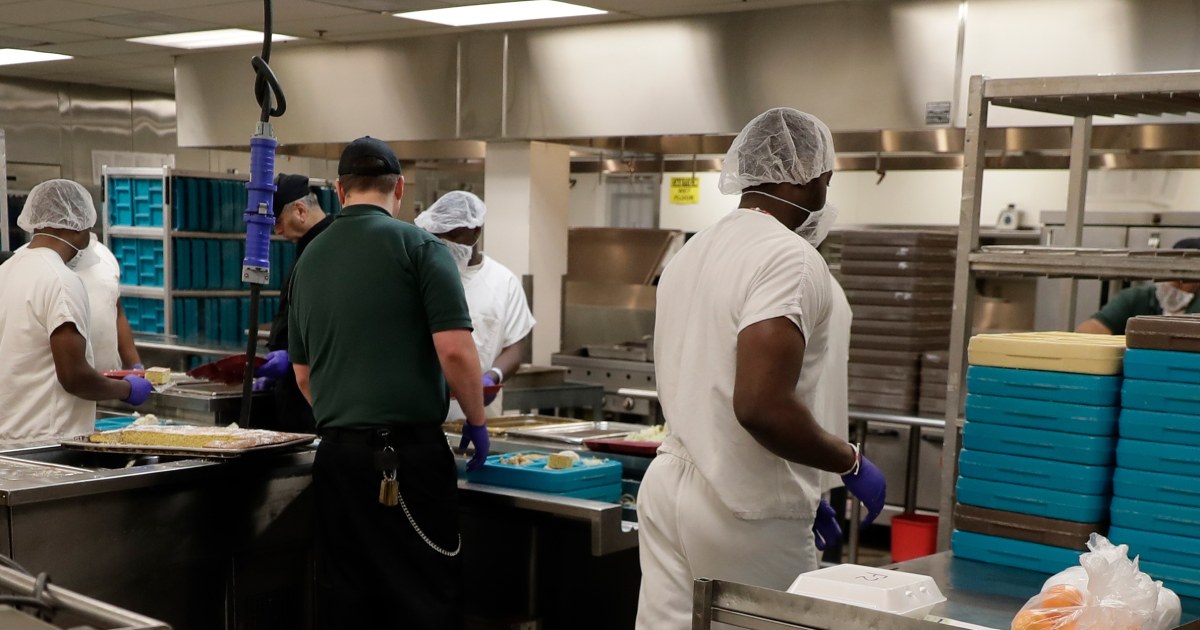Caregiving staff say agents are bringing in patients, often denying them visitors and speaking on their behalf to staff
Dianne Sposito, a 69-year-old nurse, is laser-focused on providing care to anyone who enters the UCLA emergency room in southern California, where she works.
That task was made difficult though one week in June, she said, when a federal immigration agent blocked her from treating an immigrant who was screaming just a few feet in front of her in the hospital.
Sposito, a nurse with more than 40 years of experience, said her hospital is among many that have faced hostile encounters with Immigration and Customs Enforcement (Ice) agents amid the Trump administration’s escalating immigration crackdown.
The nurse said that the Ice agent – wearing a mask, sunglasses and hat without any clear identification – brought a woman already in custody to the hospital. The patient was screaming and trying to get off the gurney, and when Sposito tried to assess her, the agent blocked her and told her not to touch the patient.
“I’ve worked with police officers for years, and I’ve never seen anything like this,” Sposito said. “It was very frightful because the person behind him is screaming, yelling, and I don’t know what’s going on with her.”
The man confirmed he was an Ice agent, and when Sposito asked for his name, badge, and warrant, he refused to give her his identification and insisted he didn’t need a warrant. The situation escalated until the charge nurse called hospital administration, who stepped in to handle it.
“They’re interfering with patient care,” Sposito said.
After the incident, Sposito said that hospital administration held a meeting and clarified that Ice agents are only allowed in public areas, not ER rooms and that staff should call hospital administration immediately if agents are present.
But for Sposito, the guidelines fall short, as the hostility is unlike anything she has seen in over two decades as a nurse, she said..
“[The agent] would not show me anything. You don’t know who these people are. I found it extremely harrowing, and the fact that they were blocking me from a patient – that patient could be dying.”
Since the Trump administration has stepped up its arrest of immigrants at the start of the summer, nurses are seeing an increase in Ice presence at hospitals, with agents bringing in patients to facilities, said Mary Turner, president of National Nurses United, the largest organization of registered nurses in the country.
“The presence of Ice agents is very disruptive and creates an unsafe and fearful environment for patients, nurses and other staff,” Turner said. “Immigrants are our patients and our colleagues.”
While there’s no national data tracking Ice activity in hospitals, several regional unions have said they’ve seen an increase.
“We’ve heard from members recently about Ice agents or Ice contractors being inside hospitals, which never occurred prior to this year,” said Sal Rosselli, president emeritus of the National Union of Healthcare Workers.
Turner said nurses have reported that agents sometimes prevent patients from contacting family or friends and that Ice agents have listened in on conversations between patients and healthcare workers, actions that violate HIPAA, the federal law protecting patient privacy.
In addition, Turner said, nurses have reported concerns that patients taken away by Ice will not receive the care they need. “Hospitals are supposed to discharge a patient with instructions for the patient and/or whoever will be caring for them as they convalesce,” Turner said.
The increased presence of immigration agents at hospitals comes after Donald Trump issued an executive order overturning the long-standing status of hospitals, healthcare facilities and schools as “sensitive locations”, where immigration enforcement was limited.
Nurses, in California and other states across the nation, said they fear the new policy, in addition to deterring care at medical facilities, will deter sick people from seeking care when they need it.
“Allowing Ice undue access to hospitals, clinics, nursing homes and other healthcare institutions is both deeply immoral and contrary to public health,” said George Gresham, president of the 1199SEIU United Healthcare Workers East, and Patricia Kane, the executive director of the New York State Nurses Association in a statement. “We must never be put into positions where we are expected to assist, or be disrupted by, federal agents as they sweep into our institutions and attempt to detain patients or their loved ones.”
Policies on immigration enforcement vary across healthcare facilities. In California, county-run public healthcare systems are required to adopt the policies laid out by the state’s attorney general, which limit information sharing with immigration authorities, require facilities to inform patients of their rights and set protocols for staff to register, document and report immigration officers’ visits. However, other healthcare entities are only encouraged to do so. Each facility develops its own policies based on relevant state or federal laws and regulations.
Among the most high-profile cases of Ice presence in hospitals in California occurred outside of Los Angeles in July. Ming Tanigawa-Lau, a staff attorney at the Immigrant Defenders Law Center, represents Milagro Solis Portillo, a 36-year-old Salvadorian woman who was detained by Ice outside her home in Sherman Oaks and hospitalized that same day at Glendale Memorial, where detention officers kept watch in the lobby around the clock.
Solis Portillo was then forcibly removed from Glendale Memorial against her doctor’s orders and transferred to Anaheim Global Medical center, another regional hospital, according to her lawyer. Once there, Ice agents barred her from receiving visitors, denied her access to family and her attorney, prevented private conversations with doctors and interrupted a monitored phone call with Tanigawa-Lau.
“I repeatedly asked Ice to tell me which law or which policy they were referring to that allowed them to deny visits, and especially access to her attorney, and they never responded to me,” Tanigawa-Lau said.
Ice officers sat by Solis Portillo’s bed and often spoke directly to medical staff on her behalf, according to Tanigawa-Lau. This level of surveillance violated both patient confidentiality and detainee rights, interfering with her care and traumatizing her, Tanigawa-Lau said.
Since then, Solis Portillo was moved between facilities, from the Los Angeles processing center to a federal prison and eventually out of state to a jail in Clark county, Indiana.
In a statement, Glendale Memorial said “the hospital cannot legally restrict law enforcement or security personnel from being present in public areas which include the hospital lobby/waiting area”.
“Ice does not conduct enforcement operations at hospitals nor interfere with medical care of any illegal alien,” said DHS assistant secretary, Tricia McLaughlin. “It is a longstanding practice to provide comprehensive medical care from the moment an alien enters Ice custody. This includes access to medical appointments and 24-hour emergency care.”
The federal government has aggressively responded to healthcare workers challenging the presence of immigration agents at medical facilities. In August the US Department of Justice charged two staff members at the Ontario Advanced Surgical center in San Bernardino county in California, accusing them of assaulting federal agents.
The charges stem from events on 8 July, when Ice agents chased three men at the facility. One of the men, an immigrant from Honduras, fled on foot to evade law enforcement and was briefly captured in the center’s parking lot, and then he broke free and ran inside, according to the indictment. There, the government said, two employees at the center, tried to protect the man and remove federal agents from the building.
“The staff attempted to obstruct the arrest by locking the door, blocking law enforcement vehicles from moving, and even called the cops claiming there was a ‘kidnapping’,” said McLaughlin. The Department of Justice referred questions about the case to DHS.
The immigrant was eventually taken into custody, and the health care workers, Jesus Ortega and Danielle Nadine Davila were charged with “assaulting and interfering with United States immigration officers attempting to lawfully detain” an immigrant.
Oliver Cleary, who represents Davila, said a video shows that Ice’s claim that Davila assaulted the agent is false.
“They’re saying that because she placed her body in between them, that that qualifies as a strike,” Cleary said. “The case law clearly requires it to be a physical force strike, and that you can tell that didn’t happen.”
The trial is slated to start on 6 October.

https://www.theguardian.com/us-news/2025/sep/16/california-ice-hospitals-patient-care


